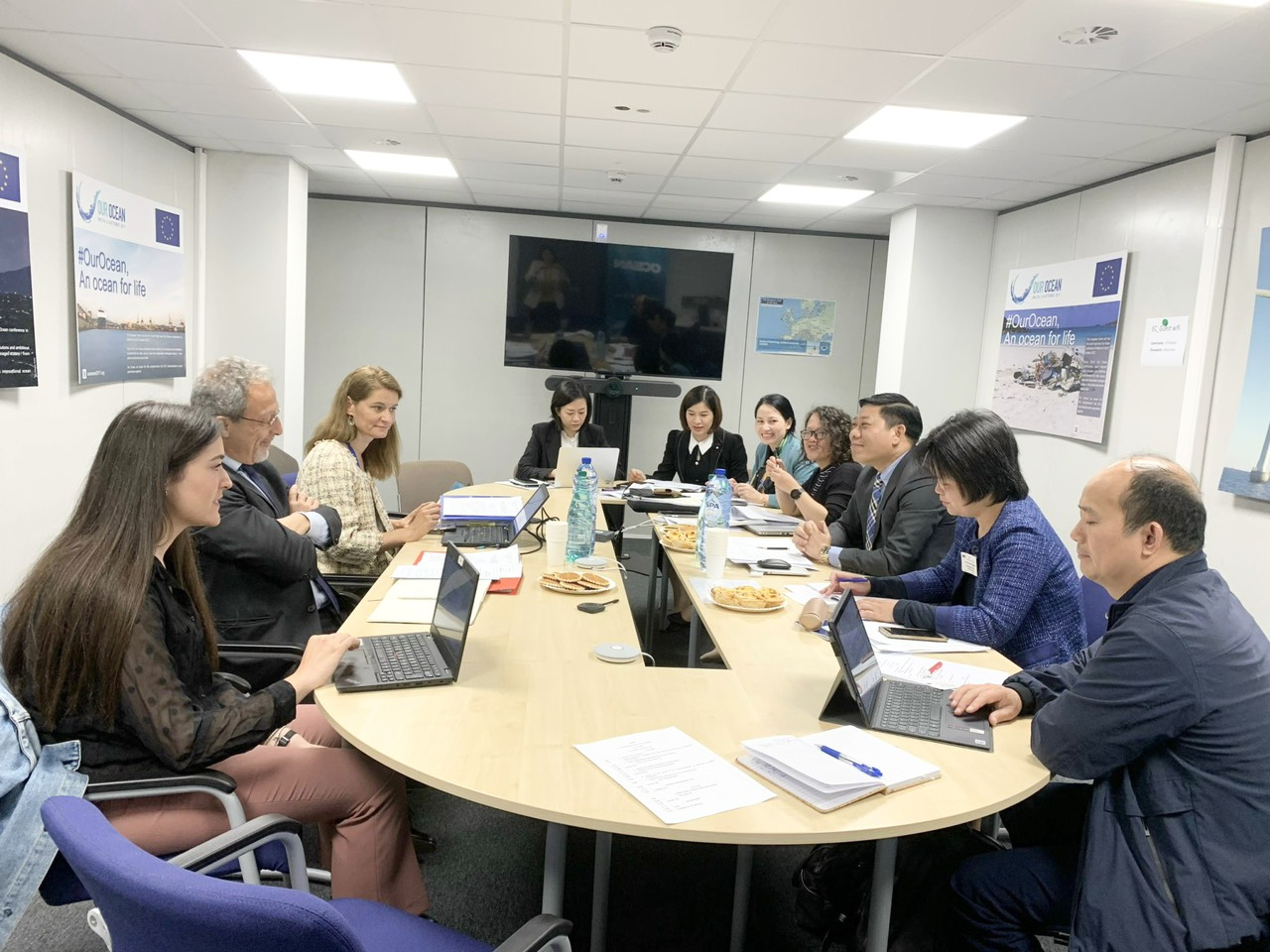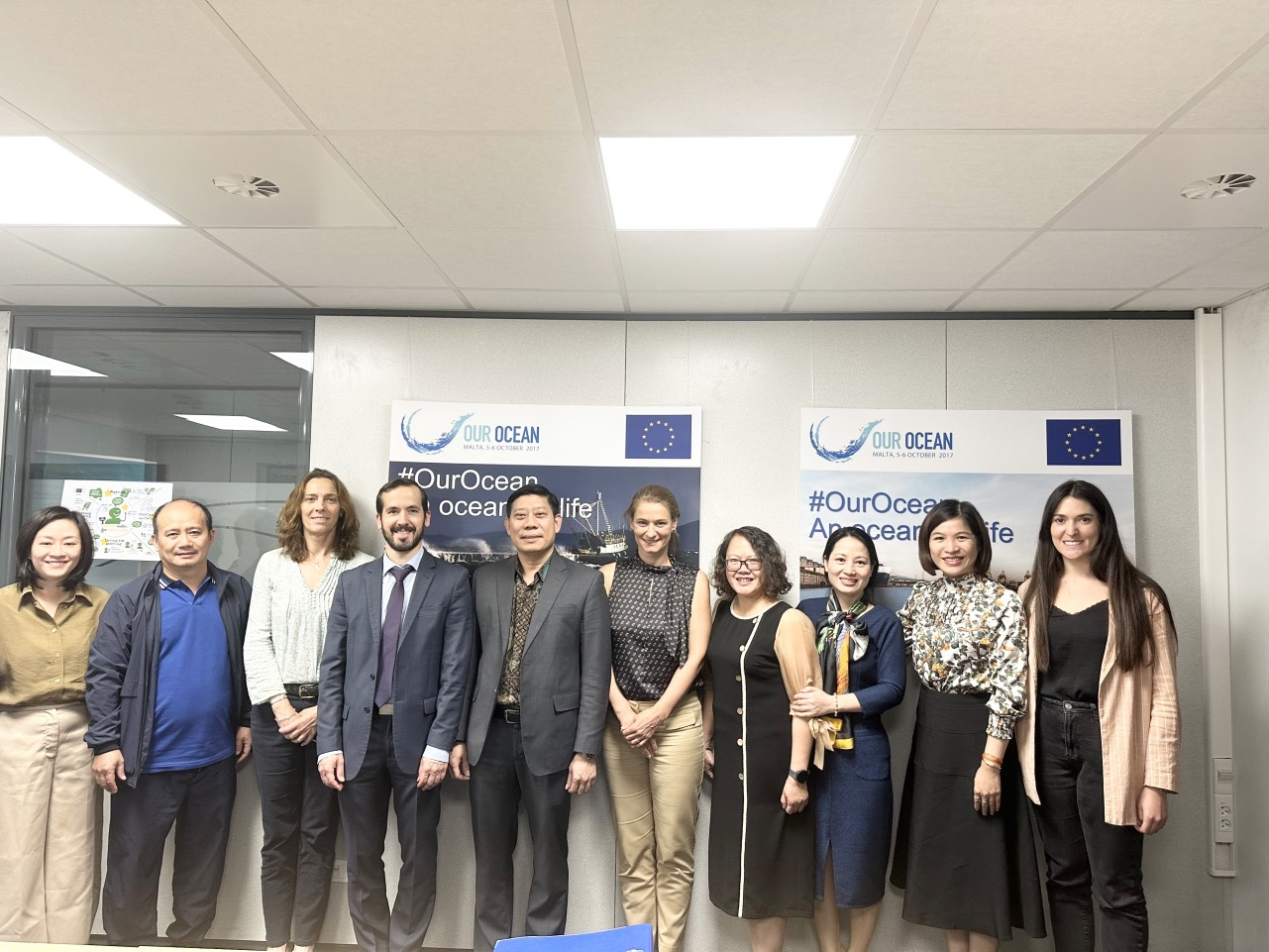June 21, 2025 | 01:53 GMT +7
June 21, 2025 | 01:53 GMT +7
Hotline: 0913.378.918
June 21, 2025 | 01:53 GMT +7
Hotline: 0913.378.918
Between July 6 and July 7, the Technical Mission of the Ministry of Agriculture and Rural Development of Vietnam (MARD), led by the Director of Vietnam Fisheries Surveillance Nguyen Quang Hung, held meetings with the European Commission's Directorate-General for Maritime Affairs and Fisheries (DG-MARE) regarding illegal, unreported and unregulated (IUU) fishing in Brussels, Belgium.

A meeting between the Technical Mission of the Ministry of Agriculture and Rural Development of Vietnam and the European Commission's Directorate-General for Maritime Affairs and Fisheries (DG-MARE). Photo: HT.
At these meetings, the Technical Mission updated Vietnam's progress in implementing the recommendations made by the European Commission during the October 2022 inspection. Both parties also engaged in an in-depth discussion regarding; Supplements and adjustments to the Decree amending Decree No. 26/2019/ND-CP to only allow for the conversion of mining license quotas to environmentally sustainable fishing; Regulations on fishing vessel monitoring system (VMS) with a focus on detailed technical requirements for VMS equipment installed on fishing vessels; Additional responsibilities of VMS equipment suppliers towards fishing vessels; Supplementing regulations on controlling the origin of fishing vessels imported into Vietnam; Regulations on the designated fishing port, namely, if a port violates the regulations on certifying the origin of fishery products or fails to meet the aforementioned requirements, it will be removed from the list of designated fishing ports.
Both parties alsdiscussed the amendment of Article 70 regarding fisheries surveillance in accordance with the Port State Measures Agreement (PSMA). Accordingly, the Article will impose stricter regulations on objects subject to inspection as well as the inspection regime in compliance with the Port State Measures Agreement. Furthermore, parties discussed supplementing regulations on the control of caught aquatic products imported into Vietnam by container ships.

The European Commission acknowledged that Vietnam has made great efforts in implementing recommendations in the fight against IUU fishing and achieved remarkable results. Photo: HT.
Regarding Decree replacing Decree No. 42/2019/ND-CP: several new sanctioning forms such as confiscation of products, suspension of export activities, etc. have been added for a number of violations. Certain activities have been classified as violations under the new Decree, including: the lack of vessel monitoring system equipment on board when the vessel is in operation; the purchasing of a fishing vessel without transferring ownership, or without registering it to a new owner's name. The Degree also permits the use of specialized technical means and equipment in the sanctioning of violations regarding the exploitation and protection of aquatic resources. Additionally, the Degree outlines the Coast Guard and Border Guard's authority to sanction violations in international waters.
Moreover, the two parties exchanged updates on the handling of two imported ships in Khanh Hoa province and updated the status of the swordfish shipments belonging to two companies in Khanh Hoa.
On the other hand, the Vietnamese Mission updated the EC on the management of fishing vessels operating at sea, and the monitoring of output through the ports; the planning on exploitation and protection of aquatic resources, the fishery management plan, and particularly the management plan for select tuna species; product traceability to ensure the legitimacy of shipments to the European market; law enforcement with regards to the sanctioning of vessels violating foreign waters; the establishment of a sanction database from central to local governments.
Mr. Nguyen Quang Hung, Director of the Vietnam Fisheries Surveillance commented: “The two parties discussed in the spirit of openness, goodwill and cooperation to solve challenges in accordance with the recommendations made by the European Commission during the October 2022 inspection. Both parties have reached an agreement on the achieved results and related exchange contents".
“The European Commission acknowledged that Vietnam has made great efforts to implement recommendations in the fight against IUU fishing and achieved remarkable results. In addition, the EC suggested Vietnam remain assertive and continue their efforts in overcoming the remaining challenges and limitations, with the aim of removing the yellow card warning in the near future," Mr. Hung said.
The Vietnam Fisheries Surveillance and the European Commission's Directorate-General for Maritime Affairs and Fisheries will hold two additional online dialogue meetings to continue exchanging information regarding the fight against IUU fishing, before the EC inspection team visits Vietnam for the fourth time in October 2023 to conduct inspections on the progress of anti-IUU fishing.
Translated by Nguyen Hai Long
![Turning wind and rain into action: [9] Digitizing hydrometeorological data in response to climate change](https://t.ex-cdn.com/nongnghiepmoitruong.vn/608w/files/news/2025/06/17/z6704423696987_15fd32ffc26d590d204d520c9dac6786-nongnghiep-165943.jpg)
(VAN) Farmers have begun accessing hydrometeorological applications to adjust their cropping schedules, aiming to ensure productivity and adapt to climate change.
![Turning wind and rain into action: [8] Real-time salinity detection and early warning technology](https://t.ex-cdn.com/nongnghiepmoitruong.vn/608w/files/news/2025/06/17/z6704423696987_15fd32ffc26d590d204d520c9dac6786-nongnghiep-151127.jpg)
(VAN) Thanks to the integration of modern hydrological-hydraulic models, remote sensing technologies, and artificial intelligence, the accuracy of hydrological forecasting has significantly improved.
![Turning wind and rain into action: [7] Early disaster warnings help marine farmers minimize losses](https://t.ex-cdn.com/nongnghiepmoitruong.vn/608w/files/news/2025/06/17/z6704423696987_15fd32ffc26d590d204d520c9dac6786-nongnghiep-142942.jpg)
(VAN) In recent years, thanks to early disaster warnings and forecasting, marine farmers in Khanh Hoa province have been able to reduce risks and losses, thereby improving production efficiency.
![Turning wind and rain into action: [6] ‘Four on-the-spot’ disaster management software](https://t.ex-cdn.com/nongnghiepmoitruong.vn/608w/files/news/2025/06/17/e5a48259d6a262fc3bb3-nongnghiep-183800.jpg)
(VAN) By simply activating the scenario on the disaster management software, the relevant authorities immediately know how many households need to be evacuated, where to evacuate them to, and by what means of transportation…
![Turning wind and rain into action: [5] Hue applies modern technology in disaster forecasting](https://t.ex-cdn.com/nongnghiepmoitruong.vn/608w/files/news/2025/06/17/z6704423696987_15fd32ffc26d590d204d520c9dac6786-nongnghiep-093938.jpg)
(VAN) In Hue city, modern technology has recently been applied in meteorological and hydrological forecasting and warning, helping to reduce the damage caused by natural disasters.

(VAN) A cutting-edge farming technique being implemented on an experimental ranch in Arizona's Sonoran Desert has already saved a billion gallons of water over five years, according to Civil Eats.

(VAN) Poultry and pig production and the environment can be boosted through enhanced water technology, according to new research.